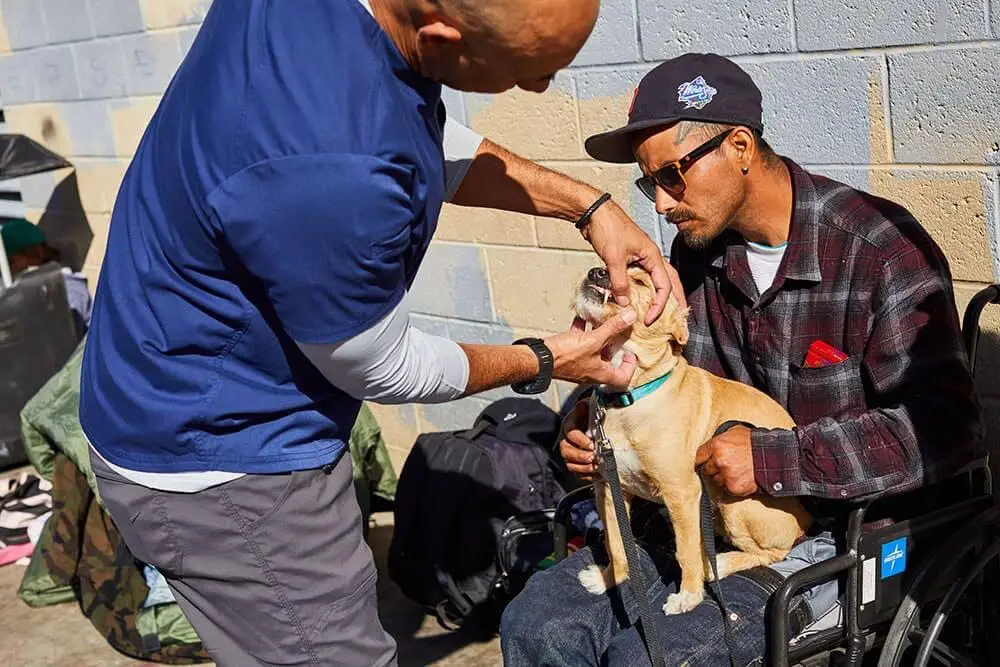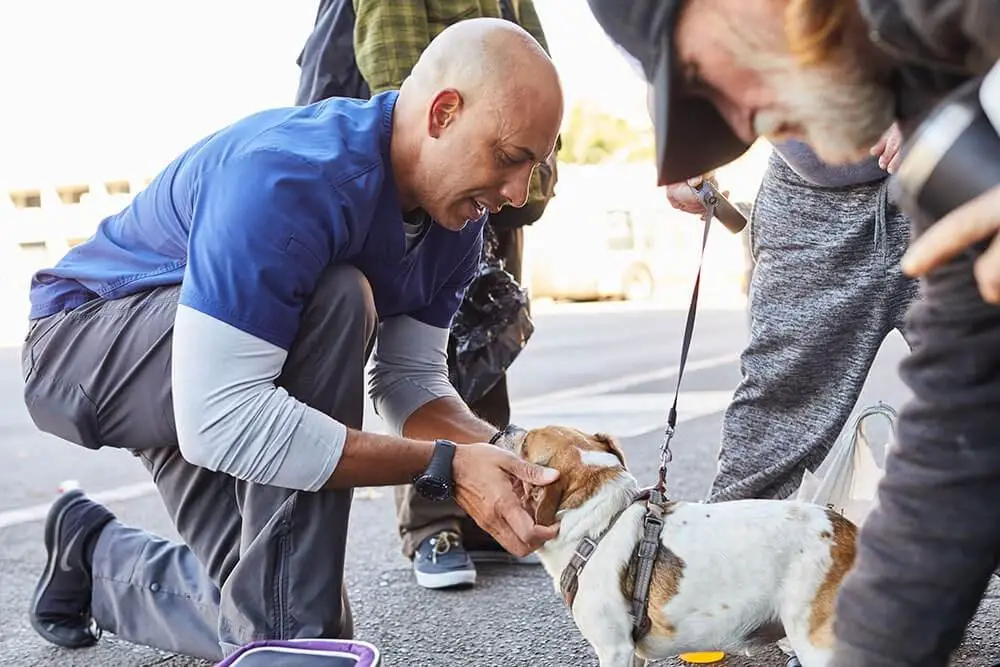Dogs are mans’ best friends. But does the same hold true for homeless people? Not according to some people.
Should homeless people have pets?
According to data by the U.S. Department of Housing and Urban Development in 2016, an estimated 550,000 people are homeless every night with about 32% of them not sleeping in shelters.
Also over 7 million Americans have lost their homes due to economic issues. Other than economic issues, they listed other factors that can contribute to homelessness including a lack of affordable housing, lack of employment opportunities, physical and mental illness, and more.
With the above, it’s understandable why people would have an issue with homeless people having pets, but the situation is a bit more complex than that.
The answer to the question about whether or not homeless people should have pets is a big yes.
According to Julianne Holt-Lunstad, Professor of Psychology at Brigham Young University, “There is robust evidence that social isolation and loneliness significantly increase risk for premature mortality, and the magnitude of the risk exceeds that of many leading health indicators.”
Homeless people are usually lonely and all alone in whatever makeshift shelter they stay in. Imagine how much companionship a dog could bring to them. If Holt-Lunstad is correct, then this could remove the risk of premature mortality which loneliness could bring to them.
Other reasons why homeless people should have dogs
1. Most times, being homeless is a temporary situation
The majority of homeless people are simply “between homes.” Their situation will get better with time and they shouldn’t have to give up their dogs as they will regret it deeply when they settle back down and their dog is gone.
According to Lorraine McGrath for the charity organization Simon Community Scotland, “Being asked to give up the only constant in their lives that gives them company, purpose, security and love simply adds more trauma and loss to an already awful journey.” [1]
2. It gives them a sense of responsibility
You might even say “a reason to keep fighting.” Most people need something or someone to care for other than themselves. When they remember that there is someone other than themselves who their actions might affect, they will want to step up and do better.
3. For security purposes
Living on the street is not only a ‘not glamorous’ thing to do but also, it is highly dangerous. You would be right to wonder what property they have that people might want to steal, but it is a real issue for them. Homeless people have their stuff stolen all the time. Other than property, they are also in danger of being hurt by other people for various reasons. However, having a dog greatly reduces their chances of being robbed or robbed. Thus, dogs help to protect and keep them safe.
4. Pets can help with mental illnesses
A 2015 survey of homeless people in the United States found that 45% of the 564,708 homeless people on the streets had a mental illness. Also, a 2008 survey by the U.S. Conference of Mayors showed that mental illness was the third biggest cause of homelessness in the U.S.
That said, there are a lot of homeless people with mental illnesses. [2] However, it seems pets, dogs especially, have a therapeutic effect on people with mental conditions. They have been proven to help treat or prevent certain mental conditions including PTSD, anxiety, and depression.
Just by being there, they can reduce stress and anxiety by increasing oxytocin, the stress-reducing hormone, and decreasing cortisol, the stress hormone.
5. They help improve the physical health of a person
Homeless people need all the help they can get to keep their strengths up and maintain their well-being. Dogs encourage them to be active especially by taking them for a walk or run daily. This exercise can greatly help cardiovascular health. A 2001 study showed that people with pets can keep their blood pressures lower when stressed than people without pets. [3]
6. Dogs are fiercely loyal
They are resilient creatures who can manage to ‘tough it out with their owners’ in the streets. They are not people who might abandon a friend because they live on the streets. Having this one constant thing in their lives will be beneficial for the homeless person in the long run. [4]
Challenges homeless people with dogs face
For starters, homeless people have a hard time providing adequate medical care for their pets. For instance, they need vaccines and treatments when they are hurt. However, vet care costs a lot of money that they may not be able to afford.
Also, pet food isn’t as cheap as you think it is. That makes homeless people more likely to feed them with human food. This practice is rather unhealthy and could cause the dogs to vomit, have diarrhea, or even pancreatitis. Another thing is that most people with pets are not allowed on public transport, so they end up walking everywhere with them. [5]
Regardless of how difficult it is for homeless people to take good care of their pets, some kind people go out of their way to help them.
One of them is Dr. Stewart Kwane
Dr. Stewart Kwane is a veterinary doctor practicing in California. The graduate of Colorado State University has been actively practicing as a veterinarian for 22 years. So far, his career has been wonderful and successful, to say the least. He was the Chief Veterinary Officer of the American Humane and the Director of their Legacy Program, No Animals Were Harmed. [6]
He then took on the less glamorous but even more fulfilling job of taking care of homeless people’s pets
This 49-year-old Good Samaritan began his mission to help homeless people’s pets in 2011. That was after the Great Recession of 2007. Dr. Kwane figured there had to be something he could do to help people in need.

The good doctor is always on duty as he carries his medical bag everywhere so he can help whenever he’s needed. However, whenever he’s not busy, he goes to the impoverished parts of San Diego, Los Angeles, Sacramento, and San Francisco, and just takes a walk down the street. Then, he offers free vaccinations and vet care to pets of homeless people he meets on the road.

“I love the work. I do it because it’s hugely rewarding to me, spiritually. I’m just very fortunate to be living out my dream to be a vet in the first place,” he said. “There’s so much need out there,” he added.

The doctor understands that it could be anyone out there on the streets. “Without the support or the backing of family and friends, I feel like a lot of us are just one or two bad luck moments or bad decisions away from being homeless ourselves,” he said. [7]
How is he able to afford the care?
Dr. Kwane uses his money to take care of the pets. He buys vaccines and drugs as wholesale which is cheaper so he doesn’t have to charge the homeless people.

He also has a GoFundMe page so he can be able to raise the money needed to cover for the more expensive surgeries some of the pups might need.

“The cost of minor treatments like ear infections, flea treatment, or vaccines can be around $100, whereas more serious cases like a tumor removal or dental with extractions can be $1,500,” he said.
For instance, there was a homeless person, Walter, who had “a connection like no other” with his dog, Dinker. Unfortunately, Dinker has a rare condition that will require extensive surgery to treat. However, from the GoFundMe, Dr. Kwane has raised over $60,000 so far. He intends to use the money to treat Dinker and other pets of the homeless.
According to the vet, “Working on the streets, I’ve experienced some of the most genuine stories of love, compassion, struggle, and hope. It’s been life-changing and truly inspiring.” [8]

Indeed, his story is inspiring. And instead of judging or belittling homeless people for choosing to remain with their beloved pets, perhaps the rest of the world should be more like Dr. Kwane and go a little out of their way to help out.
References
- “Homeless people ‘should be allowed to stay with their dogs’. BBC. Editor. Accessed March 13, 2020.
- “250,000 mentally Ill are Homeless. 140,000 seriously mentally Ill are Homeless.” Mental Illness Policy. Editor. Accessed March 13, 2020.
- “How Dogs Can Help Treat Mental Disorders.” The Recovery Village. Admin. Accessed March 13, 2020.
- “8 Reasons Homeless People ‘Deserve’ to Have Dogs.” HuffPost. Danielle Wolffe. Accessed March 13, 2020.
- “Pets of the Homeless Survey FAQ – Special Newsletter.” Pets of the Homeless. Editor. Accessed March 13, 2020.
- “Dr. Kwane Stewart.” Linkedin. Editor. Accessed March 13, 2020.
- “Meet the veterinarian who gives free medical care to pets of the homeless.” Today. Jen Reeder. Accessed March 13, 2020.
- The Street Vet” walks around California, offering free check-ups for homeless peoples’ pets. CBS News. Caitlin O’Kane. Accessed March 13, 2020.

